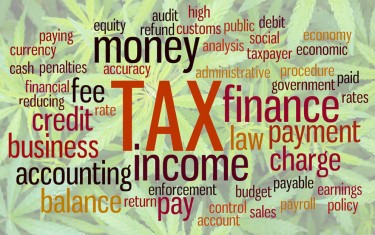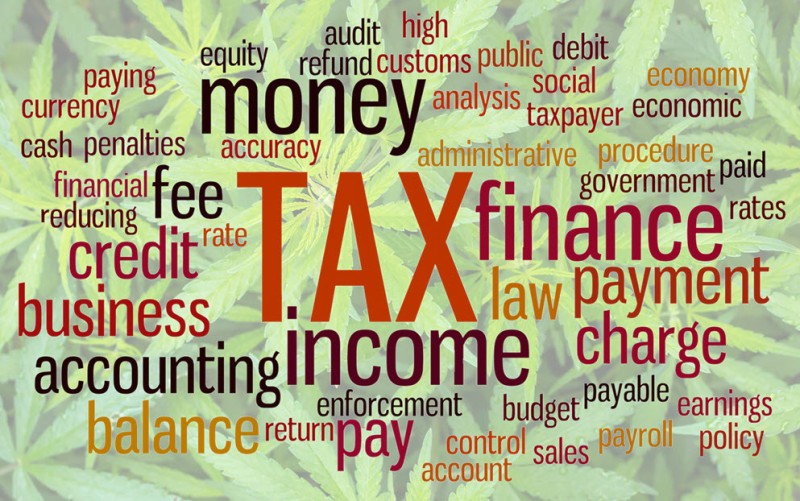
A recent report from a nonprofit think tank based in Washington, D.C., the Tax Foundation, suggests that nationwide legalization of marijuana across all states could lead to an annual cannabis tax revenue of $8.5 billion. The report outlines a proposed state and federal taxation model aimed at maintaining relatively low costs to discourage illicit sales, while also imposing higher tax rates on more potent cannabis products. The Tax Foundation criticizes the current inconsistent state-level cannabis taxation, primarily based on sales prices, as "chaotic." Despite federal prohibition, the report encourages a consideration of the advantages and disadvantages of establishing a new taxation framework that prioritizes both revenue generation and public health.
According to the report, marijuana sales contributed nearly $3 billion in tax revenue for legal states in the previous year. The projection suggests that this figure could almost triple, reaching $8.5 billion in revenue, if cannabis were legalized nationwide. The report emphasizes the importance of a well-designed excise tax, stating that such taxes when carefully crafted, can generate revenue with significantly fewer societal impacts compared to poorly designed taxes.
Designing Effective Cannabis Taxes
While it might seem reasonable in theory to tax marijuana similar to alcohol and tobacco, the Tax Foundation highlights a crucial challenge: the lack of a standardized cannabis product comparable to tobacco. Unlike tobacco, where taxes can be applied per stick or pack, and alcohol, which can be measured by alcohol content, cannabis lacks such uniformity. The intoxicating ingredient in marijuana, THC, is not as easily measured as alcohol content, posing a challenge for a targeted tax.
The report suggests an alternative approach, recommending that marijuana be taxed based on potency whenever feasible. In cases where measuring THC content is deemed impractical, the report proposes taxing products based on their weight. The organization argues that either of these methods would be superior to the current widespread practice in many states, where cannabis is taxed as a percentage of the sales price.
According to the report, a weight-based approach would effectively account for the harm associated with the use of smokable products. As product testing for THC content becomes more cost-effective over time, the report envisions a transition from taxing by weight to taxing by THC potency. In the short term, a weight-based approach is deemed more effective at capturing externalities than an ad valorem system, and it simplifies market entry for new products without imposing excessively high barriers related to product testing solely for tax purposes.
The report emphasizes that weight and potency are imperfect metrics, but they are considerably better proxies than price-based taxes. Taxes based on potency would escalate with higher THC content, making concentrated products more expensive and generating increased revenue that aligns with higher societal costs linked to more potent marijuana products. The report proposes the creation of a distinct category for edibles and concentrates due to their ease of testing, recognizing that neither weight nor potency is flawless but both represent superior alternatives to price-based taxation.
Key Lessons for Policymakers
The Tax Foundation has outlined three crucial "lessons" drawn from state experiences in taxing marijuana, offering guidance for policymakers: The report underscores that cannabis tax rates must be set "low enough to allow legal markets to undercut, or at least gain price parity with, the illicit market." Excessive tax rates have hindered certain states' ability to effectively curb unregulated sales.
While states have demonstrated the significant revenue potential of legal marijuana markets, the report notes that realizing this potential may take years and that tax revenue could be "volatile," particularly under specific tax models.
The foundation emphasizes the importance of "consistency across jurisdictions," a factor that will become even more pertinent with the potential authorization of interstate commerce. The report warns against scenarios where companies might face double taxation, such as when the originating state taxes are based on raw flowers while the receiving state levies taxes at the retail level during the point of sale. Conversely, products exported from states with only retail taxes to states with only raw material taxes may remain untaxed.
Adam Hoffer, the director of excise tax policy at the Tax Foundation, highlighted the nascent stage of legal cannabis markets and their associated tax policies. He stated that a straightforward, low-rate, and cost-effective tax system has the potential to generate substantial revenue while simultaneously reducing social harms linked to cannabis by transitioning illicit market transactions into a legal framework.
Currently, the majority of state marijuana markets implement an excise tax on cannabis products, with rates ranging from 6% in Missouri to 37% in Washington State. While some states like Connecticut and New York have introduced potency-based tax policies, such approaches remain relatively uncommon.
Federal Outlook and Monitoring Cannabis Tax Trends
Although federal lawmakers have introduced various proposals suggesting an additional federal tax on cannabis, it is not anticipated that these measures will see progress anytime soon. Nevertheless, the U.S. Census Bureau is actively monitoring state-level cannabis tax patterns. In October, the bureau unveiled an interactive map providing insights into the proportion of state revenue attributed to marijuana tax dollars.
In September, the agency published a report revealing that legal cannabis states had amassed over $5.7 billion in marijuana tax revenue over 18 months. The Census Bureau plans to update this figure quarterly. Additionally, the bureau recently enhanced its survey of private businesses to more accurately capture economic activity related to marijuana.
Simultaneously, the Congressional Research Service (CRS) issued a report last month advising caution if cannabis were to be federally legalized. Lawmakers, according to the CRS, should carefully consider the potential unintended consequences of imposing high federal taxes on marijuana products.
Bottom Line
The Tax Foundation's report underscores the significant financial opportunities associated with nationwide cannabis legalization, projecting an annual tax revenue of $8.5 billion. By advocating for a well-designed taxation model focused on potency and weight, the report navigates the challenges posed by the lack of standardized cannabis products. Policymakers are urged to set low, consistent tax rates to foster legal market growth while avoiding pitfalls like double taxation. As federal lawmakers grapple with cannabis taxation proposals, the U.S. Census Bureau monitors state-level trends, revealing the substantial $5.7 billion in tax revenue from legal cannabis states over 18 months. The overall message is clear: a thoughtful and streamlined tax system has the potential to usher in significant revenue while mitigating societal harms associated with cannabis, marking a crucial step in transitioning from illicit to legal market frameworks.
CANNABIS TAX REVENUES REVEALED, READ ON...
STATES GOT $5.7 BILLION IN WEED TAX MONEY IN JUST 18 MONTHS?







